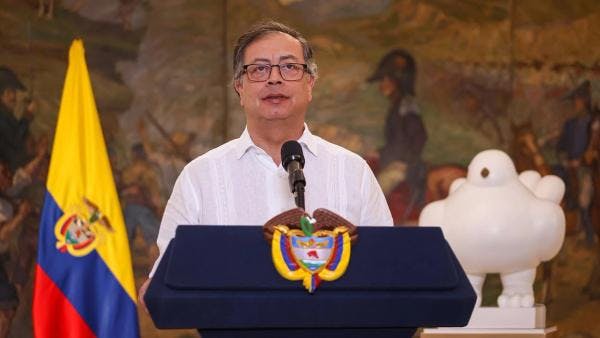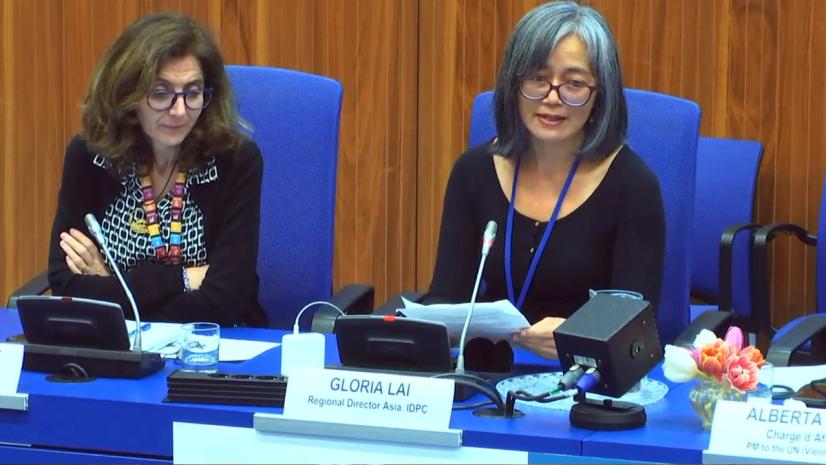Presidencia de la República - Colombia
'Starting here. Starting now.' Pro-reform coalition led by Colombia calls time on failed drug war at UN high level drugs meeting
The UN Commission on Narcotic Drugs (CND) held the first high-level meeting in five years in Vienna on 14th and 15th March, which was the culmination of a midterm review of progress made towards the commitments laid out in the 2019 Ministerial Declaration on drugs. The high-level meeting began with a somewhat muted adoption of the “outcome document” which, after months of fraught deliberations, represents very little actual ‘review’ and mostly a lot of copying and pasting from previous consensus-based UN documents (more than half of the paragraphs being direct repeats of the 2019 Ministerial Declaration). Very problematically, the outcome document entirely fails to acknowledge the devastation caused by the war on drugs.
This distinctly unambitious document does not convey how close the long-revered but increasingly fragile “Vienna consensus” came to formally breaking during negotiations. Having failed to achieve an agreed text, the CND Chair (Ghana) submitted a version for approval by ‘silent procedure’ the day before the High-level segment – a 24 hour window after which the document is considered as agreed unless a member state expresses an objection. It seems that to maintain the veneer of consensus, several member states opted not to follow-through with their threats to torpedo the whole thing.
In the end, the real highlight of the Midterm review was not this weak consensus-based document, but a subsequent statement from a coalition of 62 countries* led by Colombia. The statement calls for the reform of the international drug control system, recounts the catastrophic consequences of the war on drugs, and underscores the importance of human rights:
“If we want to impact the lives of individuals, households and communities around the globe, we need a transformation in our vision of the world drug policy, based on a realistic evidence-based assessment and a pragmatic response. Therefore, we resolve to jointly review and reassess the international drug control system to ensure weaknesses in implementation are addressed, and that we are appropriately focused on achieving our common goals and objectives to protect the health and well-being of humankind… Starting here. Starting now.”
Crucially, the statement was supported by 27 of the 53 countries that are ‘members of the CND’. When the Vienna consensus – which is widely recognised as an impediment to more progress being made in this forum – inevitably crumbles, it is only these 53 member states who would be able to vote on an outcome or decision. The fact that the majority of the voting members supported the Colombia statement means that this can, in many ways, be considered as the “alternative outcome document” from the Midterm Review.
Unsurprisingly, a response followed from more regressive governments keen to continue the status quo and ignore the harms that current policies are causing. Led by Russia, and after last-minute frantic recruitment, 46 countries** supported a counter-statement on Friday 15th March. Crucially, only 15 of these are currently CND members. The statement urged countries to “actively promote a society free of drug abuse” and lamented the “legalization of cannabis for so-called recreational purposes”. “The international community should not surrender to the scourge of the spread of illicit drugs, but on the contrary, unify efforts in a more concerted international action with a view of harm prevention”.
Strong, unprecedented and progressive statements also came from Volker Türk, calling for “transformative change in global drug policy”, in what was the first time a UN High Commissioner for Human Rights has presented at the CND in person. Similar calls for human rights-based drug policy were made by the Bolivian Vice-President (who pleaded for the UN to “free the coca leaf” from its current prohibited state, while holding the plant in his hand), and from Colombian President Gustavo Petro (who described the current international system as “anachronistic and indolent”), among others.
Among the world leaders attending was Antony Blinken, the US Secretary of State – whose whirlwind two-hour detour to the meeting included a plenary statement and a high-level side event to reaffirm the US-led Global Coalition to address Synthetic Drugs Threats, which now includes 151 countries and the USA seeks to recruit more. Blinken highlighted the heart-breaking death toll in the USA because of the fentanyl crisis: “one American dies every five minutes of an overdose”. He called for “prevention, harm reduction, treatment, and recovery support to save lives”, but also doubled down on calls for a scale-up to the prohibitionist approach which has arguably caused the crisis in the first place. In a high-level side event on harm reduction – hosted by Kenya and South Africa with a long list of supporting governments – Rahul Gupta (Director of the US Office of National Drug Control Policy) also talked about a “syndemic” of drug-related harms and the need for harm reduction responses, while INPUD’s Judy Chang told delegates that “we can’t afford to back-track, as we never got to where we needed to be in the first place”. The explicit support for harm reduction from the USA, including in a resolution to be negotiated in the main CND session this week, is an important sea change in these debates – and further shines a light on the UNODC’s ongoing aversion to the term: in the same side event, the Executive Director Ghada Waly delivered some impressive linguistic gymnastics in order to avoid saying the actual words (having run across the building fresh from the USA’s high-level event where she also failed to mention “harm reduction”).
As has now become integral to the CND, civil society was out in force at the high-level meeting – with excellent Plenary interventions delivered by Ahmed Said of the African Network of People who Use Drugs, and Diego Andres Lugo Vivas. NGOs were also able to participate in two “roundtables” that took place – with IDPC’s Gloria Lai taking her place on the panel tasked with “taking stock”, while several colleagues spoke at the event designed to “look forward”.
There was also a prominent high-level side event on human rights and the reclassification of the coca leaf led by Colombia and Bolivia at which Volker Türk spoke again clearly stating that we need a “more responsible - and humane - regulation of the drug market to eliminate profits from illegal trafficking, criminality and violence”. Choquehuanca, Bolivia’s Vice-President eloquently restated his call to end coca leaf prohibition and coca leaf sweets were distributed to the audience. H.E. Ruth Dreifuss, former President of Switzerland and member of the Global Commission on Drug Policy, strongly supported calls for reform and welcomed greater human rights attention in Vienna. H.E. Laura Gil, Colombia’s Ambassador closed the event by proudly referring to the joint statement, noting that in the past she had said, “Colombia is tired” but with this statement, now “60 countries are saying that they are tired” and are ready for a real shift in the drug policy paradigm.
Overall, despite a disappointing “outcome document”, the Midterm Review should be remembered for the growing voices of dissent, the loud calls for a global drug policy transformation, further fracturing of the so-called “Vienna consensus”, and for the agreement by the majority of voting member states of a bold “alternative outcome document”.
_
*Joint statement delivered by Colombia on behalf of Albania, Andorra, Armenia, Australia, Austria, Belgium, Bolivia, Bosnia and Herzegovina, Brazil, Bulgaria, Canada, Croatia, Colombia, Costa Rica, Cyprus, Czechia, Denmark, Dominican Republic, Ecuador, Estonia, Finland, France, Georgia, Germany, Greece, Guatemala, Honduras, Hungary, Iceland, Ireland, Italy, Jamaica, Kiribati, Latvia, Liechtenstein, Lithuania, Luxembourg, Malta, Mexico, Moldova, Montenegro, Netherlands, New Zealand, North Macedonia, Norway, Panama, Poland, Portugal, Romania, San Marino, Serbia, Slovakia, Slovenia, South Korea, Spain, Sweden, Switzerland, Timor Leste, Ukraine, United Kingdom, United States and Uruguay.
**Joint statement delivered by Russia on behalf of Algeria, Angola, Azerbaijan, Bahrain, Bangladesh, Belarus, Brunei Darussalam, Burkina Faso, China, Côte d’Ivoire, Cuba, Egypt, India, Indonesia, Iran, Iraq, Jordan, Kazakhstan, Kenya, Kuwait, Kyrgyzstan, Libya, Laos, Mozambique, Myanmar, Namibia, Nicaragua, Nigeria, North Korea, Pakistan, Palestine, Qatar, Russia, Saudi Arabia, Singapore, Sri Lanka, Sudan, Syria, Tajikistan, Tunisia, Turkey, the United Arab Emirates, Uzbekistan, Venezuela, Vietnam and Zimbabwe.


